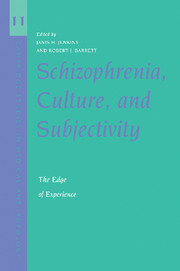Book contents
- Frontmatter
- Contents
- Contributors
- Preface
- Acknowledgments
- Schizophrenia, Culture, and Subjectivity
- Introduction
- Part 1 Culture, Self, and Experience
- 1 Schizophrenia as a Paradigm Case for Understanding Fundamental Human Processes
- 2 Interrogating the Meaning of “Culture” in the WHO International Studies of Schizophrenia
- 3 Kurt Schneider in Borneo: Do First Rank Symptoms Apply to the Iban?
- 4 Living Through a Staggering World: The Play of Signifiers in Early Psychosis in South India
- 5 In and Out of Culture: Ethnographic Means to Interpreting Schizophrenia
- Part 2 Four Approaches for Investigating the Experience of Schizophrenia
- Part 3 Subjectivity and Emotion
- Index
- References
4 - Living Through a Staggering World: The Play of Signifiers in Early Psychosis in South India
Published online by Cambridge University Press: 25 January 2010
- Frontmatter
- Contents
- Contributors
- Preface
- Acknowledgments
- Schizophrenia, Culture, and Subjectivity
- Introduction
- Part 1 Culture, Self, and Experience
- 1 Schizophrenia as a Paradigm Case for Understanding Fundamental Human Processes
- 2 Interrogating the Meaning of “Culture” in the WHO International Studies of Schizophrenia
- 3 Kurt Schneider in Borneo: Do First Rank Symptoms Apply to the Iban?
- 4 Living Through a Staggering World: The Play of Signifiers in Early Psychosis in South India
- 5 In and Out of Culture: Ethnographic Means to Interpreting Schizophrenia
- Part 2 Four Approaches for Investigating the Experience of Schizophrenia
- Part 3 Subjectivity and Emotion
- Index
- References
Summary
I was frightened without my knowledge … confusion only increased and I couldn't control it … the fear, only this fear, not anxiety, only some kind of fear …
The experience of psychosis is permeated by fear and confusion, radiating through the perceived world of suffering persons, infiltrating relationships with themselves and others. These feelings give to ordinary things an aura of strangeness and, to use Tellenbach's (1983) words, transform the “atmospheric quality” of the world. In the narratives of psychotic people, expressions of distress entwine and interlace to form the texture of a shifting world of agony. These aspects of the psychotic person's world cannot be neglected when considering the role of culture in psychosis; from such a frame emerge the questions and responses posed in this chapter.
An investigation of psychotic experience forces us to confront difficult ethical questions: How do we speak about others' suffering without redoubling the lived violence by an interpretive violence anchored in the position of the “well-informed” researcher? How do we find a language that may constitute or preserve the frightening dimension of that experience without succumbing to its fascination or objectifying it? Can we ever be justified in soliciting narratives and asking questions of people who are so deeply immersed in a world of suffering? The first two questions raise epistemological and methodological issues that will be explored in this chapter.
- Type
- Chapter
- Information
- Schizophrenia, Culture, and SubjectivityThe Edge of Experience, pp. 110 - 145Publisher: Cambridge University PressPrint publication year: 2003
References
- 18
- Cited by



